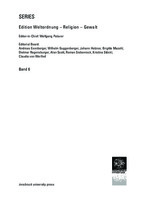Friedensmacht Europa: Dynamische Kraft für Global Governance?
| dc.contributor.author | Büchele, Herwig | |
| dc.contributor.author | Pelinka, Anton | |
| dc.date.accessioned | 2014-10-15 00:00:00 | |
| dc.date.accessioned | 2020-04-01T14:40:43Z | |
| dc.date.available | 2020-04-01T14:40:43Z | |
| dc.date.issued | 2011 | |
| dc.identifier | 502705 | |
| dc.identifier | OCN: 952619541 | en_US |
| dc.identifier.uri | http://library.oapen.org/handle/20.500.12657/33343 | |
| dc.description.abstract | The publications of the interdisciplinary and internationally networked Research Platform “World Order – Religion – Violence” seek to improve our understanding of the relationship between religion, politics and violence. It therefore deals especially with the return of religious themes and symbols into politics, with the analysis of the link between political theory and religion, and finally with the critical discussion of the secularization thesis. At the centre of the research are questions concerning the causes of violent conflict, the possibilities for a just world order and the conditions for peaceful coexistence on a local, regional, national and international/worldwide scale between communities in the face of divergent religious and ideological convictions. Its task is to initiate and coordinate thematically related research-efforts from various disciplinary backgrounds at the University of Innsbruck. It creates a network between departments, research-teams and single researchers working on topics of religion, politics and violence. The overall aim of the research platform World Order-Religion-Violence is to promote excellence in social and human science research on religion and politics at the University of Innsbruck and to guarantee the diffusion of this particular competence on a national and international level. | |
| dc.language | German | |
| dc.relation.ispartofseries | Edition Weltordnung - Religion - Gewalt | |
| dc.subject.classification | thema EDItEUR::J Society and Social Sciences::JP Politics and government::JPS International relations | en_US |
| dc.subject.classification | thema EDItEUR::J Society and Social Sciences::JP Politics and government::JPS International relations::JPSN International institutions | en_US |
| dc.subject.classification | thema EDItEUR::J Society and Social Sciences::JP Politics and government::JPV Political control and freedoms | en_US |
| dc.subject.other | european union | |
| dc.subject.other | political freedom | |
| dc.subject.other | Europa | |
| dc.subject.other | Europäische Union | |
| dc.subject.other | Vereinte Nationen | |
| dc.title | Friedensmacht Europa: Dynamische Kraft für Global Governance? | |
| dc.type | book | |
| oapen.abstract.otherlanguage | Europa – wenn es nur will! Die Europäische Union, seit 2007 weitgehend deckungsgleich mit ganz Europa, kann zum Modell für eine neue Weltordnung werden: eine politische Ordnung jenseits der Nationalismen, gestützt auf die zentralen Werte der Demokratie. Europa kann zum Eintrittsbillet in eine Zukunft werden, die durch Frieden und Nachhaltigkeit bestimmt wird. Europa kann – aber es muss nicht: zu sehr besitzen die Kräfte der alten Ordnung noch immer die Macht, diese reale Utopie von einem Europa als Vorboten von „global governance“ zu verhindern. Acht Autoren – aus der Wissenschaft und aus der Praxis – untersuchen die Möglichkeiten und Grenzen einer neuen Gestaltung Europas und der Welt. Sie diskutieren das, was möglich, und das, was wünschenswert ist. Mit Beiträgen von Kurt Bayer, Herwig Büchele, Helmut Pech, Anton Pelinka, Josef Riegler, Heinrich Schneider, Dieter Senghaas und Wolfgang Wolte. | |
| oapen.identifier.doi | 10.26530/OAPEN_502705 | |
| oapen.relation.isPublishedBy | 7e4aa047-ebd5-4269-b6c8-a86925324b93 | |
| oapen.relation.isbn | 9783902719799 | |
| oapen.series.number | 6 | |
| oapen.pages | 276 | |
| oapen.remark.public | Relevant Wikipedia pages: Europa - https://de.wikipedia.org/wiki/Europa; Europäische Union - https://de.wikipedia.org/wiki/Europ%C3%A4ische_Union; Vereinte Nationen - https://de.wikipedia.org/wiki/Vereinte_Nationen | |
| oapen.identifier.ocn | 952619541 |

